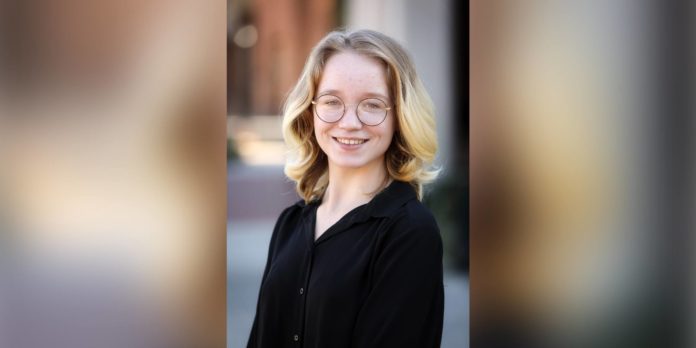Three Mercer University English and creative writing students were highlighted as finalists and winners in the highly competitive and prestigious Agnes Scott Writers’ Festival Contest, which annually invites submissions in poetry, fiction, nonfiction and playwriting. The contest is open to both undergraduate and graduate students attending a college or university in Georgia.
Submitted writing pieces are subject to a two-step judging process, with finalists and honorable mentions named in early spring, and the winners announced at the Agnes Scott College Writers’ Festival in April. Winners of each of the four categories are awarded a $500 check — and lifetime bragging rights among their peers and colleagues.
Ivy Clarke, junior creative writing and English double-major, won the coveted poetry category title and the $500 prize for her submission, “Body Image.” Clarke was also named as a finalist in creative nonfiction for her essay “Seventeen.”
In the category of fiction, Braedon Kelly, senior English major, was highlighted as a finalist for his submission, “An Offering of Fear.”
Mercer alumna Kate Eckrote was also named an honorable mention for her submission, “Fifteen Years,” in the fiction category.
“I’m thrilled to see Mercer’s writers do so well in so many categories,” said Chelsea Rathburn, assistant professor of English and creative writing and Georgia Poet Laureate. “It’s especially impressive given that their work is read anonymously alongside entries from graduate students.”
Rathburn and her colleagues, Dr. Gordon Johnston, professor of English, and Dr. James May, director of creative writing and writer-in-residence, require students in their fall creative writing classes to enter the competition because of the contest’s prestige.
“The contest is well known throughout the state, and it’s $500, which for creative writers is a whole lot of money,” said Dr. May, who won the contest while pursuing his doctorate at Georgia State University. “I think the most exciting thing, though, is that students have this chance to compete against people getting their M.F.A., and for these undergraduates to beat them out says a lot about Mercer’s program.”
Rathburn said that, given the strength of this year’s entries, she expected that Mercer would have at least one finalist. She noted that poetry winner Clarke has a very distinctive voice and cares about language deeply.
“I had an idea for how I wanted to write it, and I knew I wanted it to be fragmentary, kind of angsty and talk about women’s body issues,” Clarke said. “It was a big deal — and more than the prize money — because it meant Rita Dove, the judge and one of my poetry idols, loved my poem. I just had to sit down for a minute and take it in.”
Fiction finalist Kelly developed and revised his piece over more than one semester.
“The piece originated from a class I had with Dr. Gordon Johnston. We had a writing journal that we had to write in five or six days a week, and one of the things I ended up writing was the first scene of the story,” Kelly said. “When I found out I was a finalist, I was surprised, happy. It was awesome, and I was excited.”
If Kelly was surprised by the honor, his professors were less so.
“Braedon was already an imaginative, technically skilled writer when he arrived on campus, but he didn’t rest on those laurels,” said Dr. Johnston. “His work ethic has been consistent and remarkable. No constructive criticism is wasted on him, whether it comes from a teacher or a peer.”
Eckrote, who received an honorable mention in fiction, took only one creative writing class. Dr. May said Eckrote produces “fully developed and wonderfully strange” stories.
“I feel like a fraud because I’m not a creative writing major and my writing process is very ‘start and finish in one sitting,’ which I wouldn’t recommend to anyone,” said Eckrote, who majored in political science at Mercer. “Hearing what my peers and Dr. May said was great and helped me a lot with the draft. I was really happy, and I’ve progressed a lot from hoarding my writing in childhood journals.”
Mercer’s English Department and Creative Writing Program have been successful in cultivating writers like these and many more.
“Henry James once said a writer is a person on whom nothing is wasted. I think the success of students like Braedon, Ivy and Kate and the publishing success of other graduates like novelist Elizabeth Tammi and fiction writer Jennifer Champagne shows our program is cultivating that sort of sensitivity in our students,” Dr. Johnston said.
“Creative writing students at Mercer develop as both writers and readers. They produce their own poems, stories and essays; they critique their peers’ writing; and they study contemporary published work,” Rathburn said. “The emphasis on reading literature as well as producing their own writing helps our students contextualize their work. They understand where they fit in the larger literary tradition.”
“Preparation for this contest is an extension of all the good work that goes on in the classrooms throughout the semester,” Dr. May said. “Our classes are really heavy on revision. Sometimes students come in thinking they can write one draft of a poem and be done, but we show them it needs many rewritings. It’s not just ‘write it and send it.’ It takes a lot to get that work prepared.”
Rathburn also sees the contest as an opportunity for her students, even those that were not named as finalists or honorable mentions, to become acquainted with the process of submitting their work. Even rejection, she says, is part of the process.
“In the creative writing program, we are trying to train our students to live in the world as writers, and, like it or not, a big part of the writing life is rejection,” Rathburn said. “I always stress to my students that a lot of the writing life is a long shot — sometimes editors will say yes and sometimes no. I think learning to be a writer is learning not to take rejection personally.”
Both Rathburn and Dr. May believe the Mercer community should champion the Creative Writing Program.
“I think everyone should be proud of Mercer’s creative writers. Every time they win a contest like this one, or they enroll in a graduate program, or they publish books, poems, essays or articles, more people learn about Mercer,” Rathburn said.
Beyond showing the world that Mercer excels at training writers, Dr. May pointed to the larger good that studying writing does for communities.
“Creative writing helps to show people what it’s like to be another human being, and that’s so necessary, especially with the divided nature of our nation,” Dr. May said. “Stories keep communities together, and the ability to tell these stories is incredibly important.”










